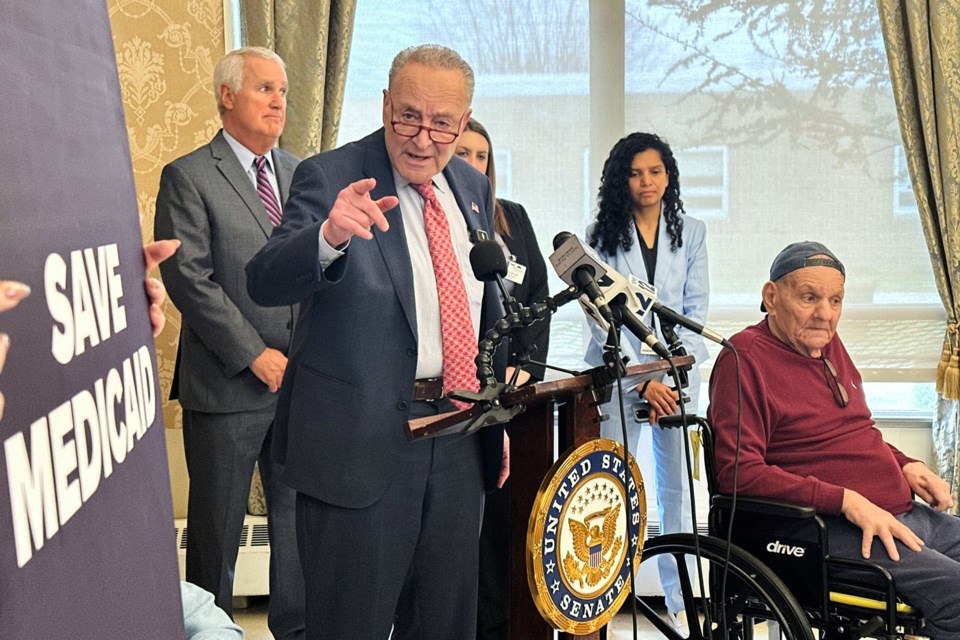HUNTINGTON, N.Y. (AP) — The Senate’s top Democrat is no stranger to . But his latest act — a tightly choreographed blitz through Republican-held districts — signals a sharpened strategy: take the fight over federal spending directly into Trump country, and force Republicans to own the response.
On Monday, Sen. visited two nursing homes, one on Staten Island, the other in suburban Long Island, to spotlight what Democrats warn would be catastrophic consequences if to slash Medicaid succeed. The choice of backdrop was deliberate, as both facilities sit in congressional districts held by GOP members who have largely aligned with President Donald Trump’s agenda.
“I’m here to localize the budget data,” Schumer said, flanked by nurses and administrators at the Staten Island facility. “We talk about the big budget issues in Washington, but they affect real people. They affect people who need this help, and cutting it would be devastating, and that’s why we’re fighting it tooth and nail.”
What might once have been dismissed as routine constituent outreach has evolved into a full-throated, offensive-minded campaign to reframe Democrats as defenders of core social safety nets — and to force Republicans to answer for the real-world impact of their budget proposals.
Monday’s events were part of a coordinated push by Schumer and Senate Democrats to take that message into Republican-held districts, where proposed Medicaid cuts hit especially . It’s a strategy aimed squarely at suburban and swing voters, as Democrats try to reclaim ground on kitchen-table issues ahead of pivotal midterm elections. And for Schumer — from progressives over recent compromises — it marks a deliberate decision to go on offense.
“Look it’s not going to work in one day, and it’s not going to work if we just do something once every week, but if we’re at it day in day out,” Schumer said in an interview with The Associated Press.
“So, we’re doing it on every front, and the public is beginning to realize how bad this stuff is, and if we keep hammering away every day, I believe Trump’s popularity and effectiveness will decline significantly,” Schumer said.
Medicaid and Medicare funding currently pays for care for the vast majority of the nation’s nursing home residents. Cuts proposed by House Republicans would shift that burden onto states, facilities, and families — or eliminate coverage outright for many of the country’s most vulnerable people. For Democrats, it’s a potent real-world consequence to contrast against abstract spending cuts and the broader GOP push for austerity.
And for Schumer, it’s a chance to remind voters that while Trump’s grip on the Republican Party remains firm, his policies have consequences far beyond cable news and campaign rallies.
Between events, Schumer toggled between party boss and retail politician. On the drive from Staten Island to Huntington, he pulled out his well-worn flip phone — a tool more common in the early Obama years than the TikTok era — to call Sen. Angus King of Maine for a birthday greeting, part of a ritual he maintains for every member of the Democratic caucus. Before hanging up, Schumer made sure to mention the crowds in New York and the Medicaid fight he’s waging.
Schumer says the Democratic strategy has crystallized around a unifying theme: that Trump and Republicans are forcing the middle class to shoulder the cost of tax breaks for the wealthy, especially through cuts to health care, Social Security, and policies like tariffs and housing.
The message, Schumer argues, offers three clear advantages. It unites the full spectrum of the Democratic caucus, from progressives like to moderates like . It resonates with voters across the political map,. And it allows Democrats to draw sharp, populist contrasts on issues that consistently poll in their favor.
The tour also reflects a recalibration of Democratic messaging, a return to “kitchen table” issues, as aides describe it, in the aftermath of over government spending, Ukraine aid, and the Middle East. Schumer himself has been the target of in recent weeks, with protesters gathering outside his home and left-leaning groups demanding new leadership in the Senate after his deal to keep the government open drew criticism from the Democratic base.
Rather than retreat, Schumer is leaning in — trying to unite Senate Democrats to speak collectively.
“We have to bring it home to the locality, and that’s what we’re doing,” Schumer said.
Schumer is also relying on what he refers to as an orchestra — with him as the conductor — to carry the message nationally. Sens. Chris Murphy, Brian Schatz, Chris Coons and Cory Booker are among those being deployed to amplify the message nationally. The Senate Democratic has also ramped up outreach, with influencers, local surrogates and community leaders helping push out clips and messaging, he said.
“Our digital outreach has gone up dramatically,” Schumer said on the drive through his Brooklyn neighborhood. “I think Democrats in the presidential campaign didn’t do it well and didn’t do enough of it, but we had like 80 influencers there on the State of the Union, and now we’ll have a whole bunch.”
For Schumer, the message is clear: Democrats aren’t waiting for campaign season to begin defining the stakes of the next election. The famously relentless tactician is betting that if Democrats keep showing up, even in the reddest corners, voters will start listening.
Michael Balsamo, The Associated Press




